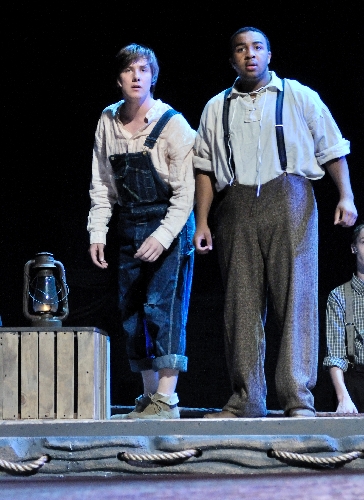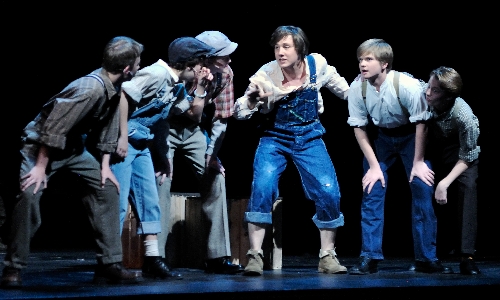Las Vegas Academy keeps racial slur in ‘Big River’ production


"It’s not what people call you. It’s what you answer to." — African-American student actress in Las Vegas Academy’s "Big River" about the N-word
Wham — there it is.
Borrowed from W.C. Fields and sage words lifewise but addressed here to one particular word — the racial slur that will remain in Las Vegas Academy’s "Big River," based on Mark Twain’s "The Adventures of Huckleberry Finn," opening tonight.
"How does it make you feel when the King says, ‘We can always sell the (N-word)’?" director John Morris asks his cast, arrayed around him on the floor of the school’s Black Box during a break from rehearsing production numbers they’ll perform at the Lowden Theater.
Splashy and ambitious, "Big River" — scored by the late Roger Miller — follows Huck and his pal, escaped slave Jim, down the mighty Mississippi River, with Twain’s infamous reference intact.
It will be spoken approximately 15 times in each of six shows. While reading it is offensive enough for many, hearing it is arguably more of a gut punch.
One young lady, disbelief in her voice, recalls a woman she knows who used the word to name her black dog. Another shakes her head, explaining how her grandmother in Arkansas casually utters it. One young man of mixed-race heritage, wearing an ironic grin, chimes in that his family tree links him to Civil War Confederate leader Robert E. Lee.
"I wish we could dig him up and tell him that," says Morris, who shares memories of his own Southern upbringing and his distaste for the word, then notes of the show: "If you’ve got more than seven or eight lines of dialogue, there is going to be something racist or offensive."
None more so to many than the N-word that remains or is removed from "Big River" based on decisions by individual theater companies.
Though the issue was born out of a publishing company, NewSouth Books, that earlier this year scrubbed the word out of its new version of the story — originally published in 1885 and still banned from some schools for the word’s inclusion — and replaced it with "slave," it will probably erupt anew as long as "Big River" is performed.
(Frank Hawkins Jr., president of the Las Vegas chapter of the National Association for the Advancement of Colored People, did not respond to several requests seeking comment.)
"I have trouble with the word, but it wouldn’t be dramatically accurate (without it), and would take away from the power of the times," says Morris, who is white, adding that a disclaimer appears in the program.
"We discussed it the first day (of rehearsal). There were no open objections, but one or two of the students of color, you could see them bristle a bit. We said it a few times in rehearsal, then we all got over it. The actors of color use it in their own characterizations. I thought I’d get more complaints than I’m getting."
Portraying Jim, 18-year-old Dimon Riley says he’d be offended by the word offstage, but "in the context of the show, it makes it stronger. There’s no point watering down the words. People want to see a real show. That’s as real as it gets."
More distressing to Riley is being chained up in Act II. "It was really hard to face," he says. "It’s hard to grasp the reality of a runaway slave."
Starring as Huck, 18-year-old Taylor Laws — his accent from his native Australia soaked in moonshine for the role — says he never heard the N-word growing up Down Under. "When I came to America, it really started to come in," Laws says. "I think it’s good we put it in because it’s part of the literature Mark Twain wrote for a purpose. He wrote it to show the distinction of the times."
Reviewing its 1985 Broadway debut, then-critic Frank Rich of The New York Times — whose critique never addressed the N-word — wrote that "the show has a lot going for it" but was ultimately "a mixture of the modestly engaging and the tolerably bland" with a libretto that "flattens out an American ‘Ulysses’ into ‘The Hardy Boys.’ "
Still, Miller’s score snared a Tony Award, and the musical is a popular pick among school and regional theater companies nationwide, controversy notwithstanding. The academy will submit its production to the national Thespian Festival for school shows in Lincoln, Neb., next June.
"You’ve got to keep it moving like a freight train," says Morris about criticism that the show lags in Act II. "We just send that sucker down the hill. We’re staging it as if the whole thing takes place at the docks at the edge of the river. We see those moving docks, it’s very boatlike, very bargelike, and that keeps it moving."
So it was at rehearsal when the 33-member cast took the floor to run through the big, boisterous opening number, "Do Ya Wanna Go to Heaven," in which the townsfolk lecture Huck on learning to write and read the Bible.
Even more spirited was the break-time discussion, during which Morris ran a slide show of grainy photos from the days of slavery and Reconstruction to give his cast context.
"Rape, slaughter, misappropriation of an entire race of people for three or four centuries," Morris tells them. "Something in Mark Twain said this story needed to be told, so we need to tell it. What does it mean when you sing, ‘I am free at last’?"
Free, yes. Free of that word, no.
Contact reporter Steve Bornfeld at sbornfeld@review journal.com or 702-383-0256.
PreviewWhat: "Big River"
When: 7 p.m. today, Friday, Saturday, Nov. 17-19
Where: Lowden Theater for the Performing Arts, 315 S. Seventh St.
Tickets: $18 (800-585-3737)












